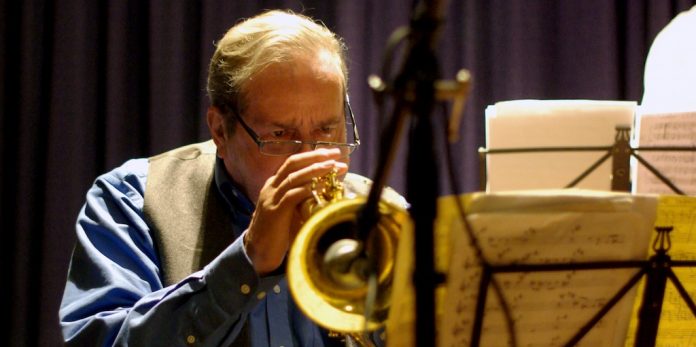
Two days of concerts held at the Royal Academy of Music in London celebrated the 50th anniversary of the birth of the illustrious independent jazz label ECM (Edition of Contemporary Music). Founded in Munich in 1969 by producer Manfred Eicher, the label has issued in excess of 1500 albums spanning many idioms. Thursday 30th January brought an evening of music from the academy’s jazz ensemble led by Swedish bassist Anders Jormin and American pianist Craig Taborn. The following night’s concert however provided something rather different and not merely because of another event occurring at 11pm the same evening.
Proceedings commenced with the presentation of Fellowship of the Royal Academy of Music to virtuoso pianist and RAM alumnus Kit Downes, also an ECM artist and former participant in the groups Troyka and Empirical. Downes then led his trio, Enemy, accompanied by students from the jazz and strings departments in a joint performance. In the second half of the concert, the Academy Big Band presented the music of Kenny Wheeler, in celebration of what would have been the trumpeter and composer’s 90th birthday on 14 January, alongside guest artists Norma Winstone, Evan Parker and Stan Sulzmann. Wheeler’s handwritten sketches and scores from his first BBC broadcasts in the 1970s (donated to the Academy’s archives) had been specially reconstructed for the first time since their original performances at Maida Vale Studios. These included elements from his second album, recorded in 1973 for Incus, Song For Someone.
The opening set featured Kit Downes’ trio Enemy augmented by the Academy Ensemble. But first Enemy performed as a trio, affording the audience the opportunity to savour the talents of Downes and his compatriots. Swedish bassist Petter Eldh was on particularly mercurial form and the ever-dependable James Maddren on drums (another RAM alumnus), showed why he is one of the most in-demand percussionists playing in the UK. The unexpected highlight of this first half of the evening was the string quartet and horn ensemble joining the trio for three numbers. The first piece, Eldh’s Children With Torches with breathtaking pizzicato strings at its outset, was characterised by its staccato angularity, whereas the ensuing composition, Downes’ Politix, was more introspectively legato-rich. The finale, Eldh’s Prospect Of K, was a masterclass in effervescent exuberance, fizzling and crackling and mesmerically engaging throughout. Notably the trio seemed to be enjoying this rare performance immensely, the culmination of a whole week of guest tutoring the RAM students.
The post-interval performance of Wheeler’s music allowed an alternating cohort of students from the academy’s jazz department to play alongside the three eminent guests. But the real icing on the cake was the set of Wheeler’s inimitable compositions, gleaned from his archives and rarely if ever heard before, let alone given a public performance. Numbers played included The Sweet Yakity Waltz, featuring Winstone, and Some Days Are Better Suite which showcased Winstone again on spectacular form and Parker in a blazing tenor solo. Dallab, benefiting from one of Wheeler’s trademark wry titles (ballad, spelled backwards) featured Sulzmann on a typically soaring soprano solo. It was also good to hear two students, Alma Naidu and Ella Hohnen-Ford, effortlessly tackling the demanding wordless vocals on Everybody Knows It and doing so with outstanding verve and aplomb. Wheeler’s writing often incorporated Winstone (as heard on Song For Someone) – not as a conventional lyric-based singer, but rather as another melodic instrumentalist, a role which Winstone has famously pioneered over her career.
Kudos must also go RAM’s Head of Jazz Nick Smart, who conducted the big band and put this whole memorable evening together. The evening undoubtedly demonstrated that Wheeler was not just a peerless trumpeter of international renown but was crucially a composer and arranger of outstanding imagination and invention. The world needs to hear more of Wheeler’s fabulous tunes and the RAM should be highly praised for their consistent support of this self-effacing genius.















